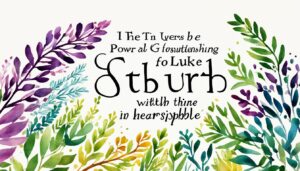
Luke 15:11-32 is a powerful parable that offers profound insights into the nature of forgiveness, redemption, and the unconditional love of God. This passage, commonly known as the Parable of the Prodigal Son, has long been cherished for its poignant message of hope and reconciliation. However, there are often misconceptions surrounding the complexity and depth of this parable, which we will now explore.
Key Takeaways:
- The Parable of the Prodigal Son challenges preconceived notions and offers a fresh perspective on forgiveness and redemption.
- Understanding the context of Luke 15:11-32 within the Gospel of Luke enhances our appreciation of its significance.
- The parable emphasizes the transformative power of forgiveness and the abundant grace of God.
- Examining the role of the elder son sheds light on the dynamics of sibling relationships and the call to embrace compassion.
- Unraveling the deeper meaning of forgiveness and reconciliation can have a profound impact on our relationships and personal growth.
Understanding the context of Luke 15:11-32 in the Gospel of Luke
To fully appreciate the significance of Luke 15:11-32, it is essential to examine the context in which it is situated within the Gospel of Luke. This gospel, written by the physician and historian Luke, seeks to provide an orderly and accurate account of the life, teachings, death, and resurrection of Jesus Christ. Luke’s intent is to offer a comprehensive and systematic approach to presenting the story of Jesus to his audience.
The Gospel of Luke places great emphasis on the themes of mercy, forgiveness, and inclusivity. It explores the compassionate nature of Jesus and his ministry to the marginalized, the outcasts, and the sinners. Luke seeks to illustrate the limitless love and grace of God through the stories and teachings of Jesus, inviting his readers to embrace repentance and experience the transformative power of divine mercy.
Unconditional Love
| Gospel of Luke | Context | Biblical Verses |
|---|---|---|
| Themes | Mercy, forgiveness, inclusivity | Various |
| Purpose | To provide orderly and accurate account of the life, teachings, death, and resurrection of Jesus Christ | Various |
Specifically, within the context of the Gospel of Luke, Luke 15:11-32 comes as part of a series of parables that focus on the theme of lost and found. These parables, including the Parable of the Lost Sheep and the Parable of the Lost Coin, emphasize the joy in heaven when a lost sinner repents and returns to God. They highlight the compassion of God, who eagerly awaits the return of those who have strayed from His presence.
By understanding the context and themes of the Gospel of Luke, we can gain a deeper appreciation for the significance of Luke 15:11-32. This parable serves as a powerful illustration of God’s unconditional love, forgiveness, and the call for reconciliation. It challenges our understanding of justice and mercy, inviting us to examine our own attitudes towards repentance, forgiveness, and the restoration of relationships.
The Parable of the Prodigal Son: A story of redemption and grace
The Parable of the Prodigal Son recounts the tale of a wayward son who experiences a transformative journey of redemption and encounters the unbounded grace of his loving father. This powerful story, found in Luke 15:11-32, is rich in symbolism and offers profound insights into the nature of forgiveness and unconditional love.
At the heart of this parable lies the prodigal son’s decision to leave his father’s house and squander his inheritance in reckless living. After hitting rock bottom and realizing the emptiness of his choices, he humbles himself and returns to his father, hoping to be received even as a hired servant. However, the father’s response is far beyond what the son could have imagined.
Upon seeing his wayward child in the distance, the father runs to him, embraces him, and celebrates his return. This act of unconditional love represents the divine forgiveness and grace that permeate the narrative. It is a powerful reminder that no matter how far we may have strayed, we can always find our way back to the loving embrace of God.
| Key Themes: | Biblical Verses: |
|---|---|
| Redemption | Luke 15:11-32 |
| Forgiveness | Luke 15:20-24 |
| Unconditional Love | Luke 15:20 |
| Grace | Luke 15:20-24 |
The Parable of the Prodigal Son serves as a powerful reminder of the transformative power of redemption, the boundless nature of God’s grace, and the importance of forgiveness in our relationships. It challenges us to examine our own attitudes towards those who have strayed, reminding us that our response should mirror that of the loving father in the parable. Just as the prodigal son was welcomed home with open arms, so too should we extend forgiveness and embrace those who seek to return to a life of righteousness.
The role of the elder son in Luke 15:11-32
While the prodigal son steals the spotlight in Luke 15:11-32, the elder son’s character offers valuable insights into the complexities of sibling relationships and the challenges of forgiveness. His role in the parable serves as a reminder that forgiveness is not always easy, especially in situations where we feel overlooked or taken for granted.
“But he was angry and refused to go in.” – Luke 15:28
It’s clear that family relationships are complicated because the oldest son hates it when his brother comes back. He worked hard while his younger brother wasted his money, so it makes sense that he feels hurt and jealous. There are important things to think about when we forgive in this story. Do we hold grudges when other people do well? Even though we feel ignored, can we let go of anger and accept compassion?
By looking at the older son’s character, we can see how hard it is for us to forgive others. It tells us that forgiving someone forces us to stop complaining and try to make things right. It forces us to think about how we forgive and how much we need compassion and understanding, especially when something is wrong.
The importance of empathy and understanding
One valuable lesson we can learn from the elder son’s character is the importance of empathy and understanding. Through his story, we are reminded of the impact of our actions and attitudes towards others. By placing ourselves in the shoes of the elder son, we can better comprehend the difficulty he faced in forgiving his brother. This empathy encourages us to approach situations with compassion and to seek reconciliation rather than perpetuating resentment and division.
| Elder Son’s Challenges | Lessons Learned |
|---|---|
| Jealousy | Recognizing the destructive nature of jealousy and striving for contentment in our own lives. |
| Resentment | Fostering forgiveness and releasing resentment for the sake of personal growth and healthy relationships. |
| Overlooked or undervalued | Understanding the importance of self-worth and finding validation from within rather than seeking external recognition. |
The inclusion of the elder son’s character in Luke 15:11-32 serves as a powerful reminder of the challenges that accompany forgiveness. It encourages us to reflect on our own attitudes and actions, and to strive for understanding, empathy, and reconciliation in our relationships. By learning from his story, we can deepen our capacity for forgiveness and foster greater compassion for others.
Unraveling the Deeper Meaning of Forgiveness and Reconciliation
Luke 15:11–32 encourages us to consider how forgiveness might change our relationships and spiritual growth. The Parable of the Prodigal Son is a captivating story about heavenly forgiveness and reconciliation.
This fable is about a father who welcomes his son back after he rebels and wastes his inheritance. This powerful act of forgiveness restores the father-prodigal son relationship and pushes us to evaluate our own ability to forgive and extend grace to those who have harmed us.
Our relationships need reconciliation, as the parable shows. It shows how forgiveness heals relationships and ourselves. When we reconcile with people, we might discover peace and completeness like the prodigal son did after his father forgave him.
The Lessons of Forgiveness
When we unpack the deeper meaning of forgiveness as portrayed in Luke 15:11-32, we find valuable lessons that can guide our lives. Forgiveness is not only an act of mercy but also an opportunity for personal growth and spiritual transformation. It requires us to let go of resentment and embrace empathy and understanding. Through forgiveness, we not only release the burden of anger and bitterness but also create room for love, compassion, and genuine connection.
| Key Lessons on Forgiveness in Luke 15:11-32 |
|---|
| “Forgiveness is an act of unconditional love.” |
| “Forgiveness promotes healing and restoration.” |
| “Forgiveness frees us from the chains of resentment and anger.” |
Luke 15:11-32’s deep teachings on forgiveness and reconciliation should motivate us to embrace forgiveness’s transformative potential in our own lives. May we forgive those who have wronged us and seek reconciliation with ourselves and others, feeling the powerful impact of forgiveness on our relationships and spiritual growth.
Dissecting the Significance of the Father’s Reaction in Luke 15:11-32
In Luke 15:11–32, the father’s response shows an infinite amount of love and kindness that is hard to understand. In this story, Jesus talks about a son who goes astray, wastes his wealth, and then asks his parents to forgive him. The father’s kind and caring reaction to his son’s return shows how much parents love their children and how much God loves all people.
In the story, the father hugs his lost son right away to show that he loves him no matter what. The father doesn’t reject or punish him; instead, he runs to meet him, kisses him, and is glad to see him again. People who want this kind of love are given endless kindness and forgiveness.
Societal Expectations
Moreover, the father’s response challenges societal expectations and norms. In the cultural context of that time, it was unthinkable for a father to welcome back a prodigal son who had brought shame upon the family. Yet, the father’s actions demonstrate a radical love that transcends societal conventions and demonstrates the inclusive nature of God’s love.
| Key Themes | Implications |
|---|---|
| Unconditional Love | The father’s response portrays love that is not contingent on the son’s actions or worthiness. It teaches us to extend love and grace to others, even in the face of their failures or mistakes. |
| Boundless Mercy | By forgiving his son and celebrating his return, the father models the limitless mercy that God offers to all who repent and turn back to Him. It reminds us that no sin is beyond the reach of divine forgiveness. |
| Inclusive Acceptance | The father’s embrace challenges societal divisions and exclusion. It teaches us to extend acceptance and forgiveness to all, regardless of their past or current circumstances. |
How the father dealt with his son who went off to live with other people is a timeless example of love, forgiveness, and kindness. It tells us to think about how much God loves His children and show that love in the way we treat each other. The father’s answer shows how powerful forgiveness is, how important kindness is, and how beautiful unconditional love is.
Lessons from Luke 15:11-32: Embracing forgiveness and compassion
Luke 15:11–32 teaches forgiveness, compassion, and grace for redemption and reconciliation. The Parable of the Prodigal Son tells of a son who wastes his inheritance and returns humbled and remorseful. This story connects with human experiences of brokenness, forgiveness, and love’s transformational power.
One of the main teachings from this fable is forgiveness. Our father’s unfailing love and forgiveness for his fallen son shows us that forgiveness is vital and healing. It shows us that if we own our mistakes and seek forgiveness, we can find redemption no matter how far we’ve gone.
Luke 15:11-32 emphasizes compassion. The father’s response to his prodigal son’s return shows great compassion and sensitivity. Without hatred or judgment, the father welcomes his son home and celebrates. This emphasizes the necessity of compassion and realizing that we all make errors and need support.
| Key Lessons from Luke 15:11-32 |
|---|
| Forgiveness is a powerful act that allows for redemption and reconciliation. |
| Compassion and empathy are essential in dealing with others’ mistakes and shortcomings. |
| We should be willing to extend grace and understanding, just as the father did in the parable. |
“He was lost and is found.” – Luke 15:24
In conclusion, Luke 15:11–32 shows how forgiveness, compassion, and unlimited grace can redeem and reconcile. It shows that love and forgiveness can heal and rebuild in any situation. By using these teachings, we may foster compassion and understanding in ourselves and society.
Parables as vehicles for spiritual understanding and growth
Luke 15:11-32’s parable conveys divine precepts, spiritual insight, and personal improvement. Parables capture our hearts and minds with vivid imagery, engaging characters, and thought-provoking storytelling, prompting us to contemplate their deeper truths.
Parables simplify complex theological notions. These stories reveal important truths about God, humanity, and our relationship with the divine. They make us think about our actions, beliefs, and values in light of their everlasting wisdom.
“The power of parables lies in their ability to engage both our intellect and our emotions, drawing us into a deeper understanding of God’s love and grace.” – Unknown
Furthermore, parables allow personal growth and change. As we follow the characters’ challenges, dilemmas, and redemptive journeys, we are urged to analyze our own lives and apply the lessons learned. Parables make us think about our mistakes, seek forgiveness, and show others compassion and kindness.
Parables and the mustard seed
Bible parables like the mustard seed show this transformational ability. Jesus compares the kingdom of heaven to a mustard seed that matures into a tree that shelters birds in Matthew 13:31-32. This tale shows us that even modest acts of faith and obedience can increase God’s kingdom.
| Bible Verse | Key Message |
|---|---|
| Matthew 13:31-32 | The kingdom of heaven starts small but grows into something significant. |
| Mark 4:30-32 | The kingdom of God is like a mustard seed that grows into a large tree. |
| Luke 13:18-19 | The kingdom of God is like a mustard seed that grows into a tree and provides shelter for birds. |
Parables urge us to grow in faith, improve our comprehension, and let their meanings change our lives. These timeless stories take us on a spiritual journey that teaches us about God’s love, forgiveness, and compassion.
The enduring significance of Luke 15:11-32 in Christian faith
The lessons in Luke 15:11–32 will always be useful for Christians. People have been moved by the Parable of the Prodigal Son’s messages of redemption, acceptance, and God’s unending love for hundreds of years.
Luke 15:11–32 encourages people to get along and forgive each other. Like the father who hugs his lost son without judging him, we should love and forgive others. This story makes you want to forget and care about stray animals.
How happy the father is to see his son again shows how much God loves him. Luke 15:11–32 tells Christians of God’s huge love and grace for people who have changed their minds and made peace with him. It is stressed how kind God is and how divine love changes things.
The enduring lessons of Luke 15:11-32
“There is no obstacle that cannot be overcome through the power of forgiveness and the embrace of compassion. Luke 15:11-32 reminds us that love has the transformative power to heal, restore, and reconcile.”
Luke 15:11-32 reminds us of the moral and ethical ideals at the basis of Christianity. This parable inspires us to forgive recklessly and love the unworthy.
Luke 15:11-32 promotes love, redemption, and abundant grace in a culture that values power, prosperity, and material riches. It tells us that true pleasure and fullness come from deep connections and unconditional love.
Christian living requires us to follow Luke 15:11-32. We are asked to forgive, reconcile, and love to emulate the glorious divine compassion of the tale. Through our actions, we may highlight this amazing story and its transformative impact on Christian faith.
| Key Themes | Key Lessons |
|---|---|
| Forgiveness and Reconciliation | Extend grace and compassion to others, just as God does for us. |
| Unconditional Love | Embrace and celebrate the inherent worth of every individual. |
| Redemption and Restoration | Recognize the transformative power of divine love and seek repentance and reconciliation. |
Reflecting on the broader themes of Luke 15:11-32 in contemporary society
Luke 15:11–32 asks us to think about forgiveness and compassion in light of current morals and Christian beliefs. The story of the Prodigal Son shows how love, forgiveness, and kindness can change us.
In today’s quick-paced, harsh world, it’s hard to find forgiveness and kindness. No matter how far apart or broken we are, this story shows that we can get back together. When we look at our relationships with others and ourselves, we should try to be more kind and patient.
Luke 15:11–32 shows how important Christian morality is in today’s world. The parable tells us that forgiveness, empathy, and love should be our top goals. It makes us want to show kindness in our communities and forgive those who have hurt us.
| Key Themes in Luke 15:11-32 |
|---|
| Forgiveness |
| Redemption |
| Compassion |
| Unconditional Love |
These themes resonate deeply within our human experience, transcending time and cultural barriers. They remind us of our shared humanity and the potential for growth and transformation that lies within each of us.
Applying the Parable’s Lessons
Thinking about the main ideas in Luke 15:11–32 makes us want to forgive and show kindness every day. When we think about our grace, it makes us want to show it to others, even when we’ve been hurt or betrayed.
Get rid of your anger and hatred, and forgive those who have hurt you. It might take a while to get better and trust again after you forgive someone.
Be caring: Understand what other people are going through and offer support and kindness. Kindness in small ways can make a big difference in people’s lives.
Love everyone no matter what and see their worth and respect. Celebrate how special each person is by accepting and including everyone.
We can make the world a better place by acting with the grace and kindness shown in The Parable of the Prodigal Son.
The impact of Luke 15:11-32 on personal faith and spiritual growth
From Luke 15:11–32, we can find hope, comfort, and advice on how to deal with life’s problems in order to grow in faith and spirituality. The timeless lessons in The Parable of the Prodigal Son are enjoyed by people from all walks of life.
This story shows how everyone wants to be accepted, forgiven, and important. It helps us look back on our journey and be brave and humble when we make mistakes. No matter how far we go, the story of the lost son shows us that we can be forgiven, made right with our mistakes, and put back together again.
The story gives us hope and comfort when life gets hard. We can receive God’s love and kindness no matter how broken we are. It helps people be open, accept, and be kind to themselves and others. This story can help us understand God’s love and forgiveness, get through hard times, and grow spiritually.
| Inspirational Quotes from Luke 15:11-32 |
|---|
| “But while he was still a long way off, his father saw him and was filled with compassion for him; he ran to his son, threw his arms around him and kissed him.” – Luke 15:20 |
| “We had to celebrate and be glad, because this brother of yours was dead and is alive again; he was lost and is found.” – Luke 15:32 |
Luke 15:11–32 advises us to be humble, forgive others, and give them a second chance. The story tells us to accept our flaws and grow closer to God and other people. Even though it hurts and betrays you, it demands grace, love, and mercy. Deep truths in this story can heal, strengthen, and renew our faith, helping us grow emotionally and find God’s love that knows no bounds.
Shedding new light on Luke 15:11-32: A parable of love, redemption, and abundant grace
Luke 15:11–32 is a well-known story that can help us accept love, forgiveness, and grace and grow emotionally. In this interesting story, a son wastes his fortune on wild living and feels hopeless. His loving father, on the other hand, immediately forgives him and hugs him.
The story of the Prodigal Son shows how much God loves and forgives us. It also teaches us how to forgive, make peace, and care for others. That we can always come back to grace, no matter how far we’ve gone. Like the wayward son, we can get better when we forgive ourselves, others, and God.

Conclusion
The father’s boundless love represents our Heavenly Father’s compassion. Despite our past mistakes, we deserve love, forgiveness, and second chances. Parable teaches us to forgive and care for others like the father did for his prodigal son.
Love, atonement, and boundless grace in Luke 15:11-32 should inspire us. Forgiveness, reconciliation, and assisting others should reflect these qualities. Let this fable guide our spiritual journey by reminding us of love’s transforming power and God’s limitless mercy.
FAQ
Q: Where can I find the Bible verse about the mustard seed?
A: The Bible verse about the mustard seed can be found in multiple passages. In Matthew 17:20, Jesus says that faith the size of a mustard seed can move mountains and make anything possible. In Matthew 13:31-32, Jesus compares the kingdom of heaven to a mustard seed that grows into a tree, providing shelter for birds. Mark 4:30-32 and Luke 13:18-19 also describe the kingdom of God using the analogy of a mustard seed. This small seed grows into a large tree with branches where birds can nest. These verses emphasize the power of faith and the growth and impact of the kingdom of God.








